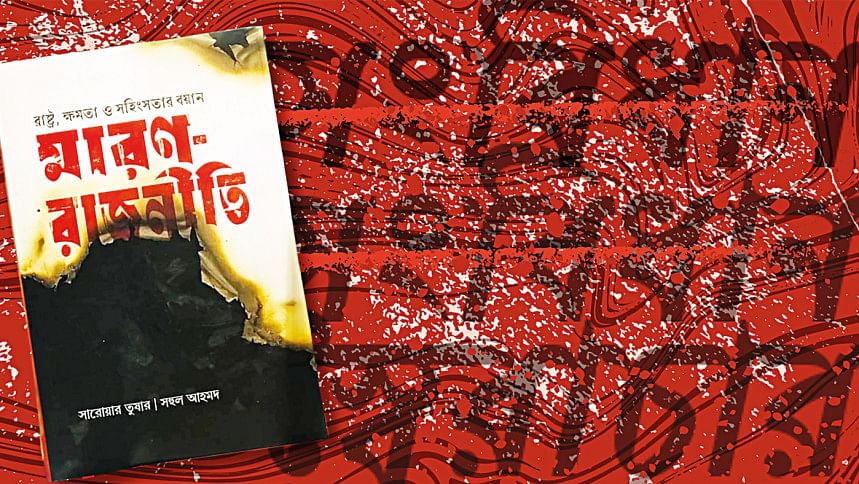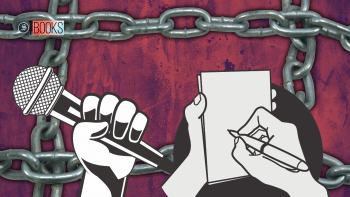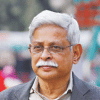Is the antidote itself a virus?

During the 53 years of Bangladesh's existence, its people have had to endure and take down two autocratic regimes; not only did they oust an autocrat in July 2024 through a mass uprising, but 1991 also saw the downfall of the autocrat, Hussain Muhammad Ershad, through another rebellion. This begs the question: why does this cycle of autocracy continue to repeat itself? Can the Constitution, the highest law of the land, not give us a solution by putting in checks and balances? The book Maron Rajneeti: Rashtro, Khomota O Shohingshotar Boyan (Adarsha, 2024) by Sarwar Tushar and Sohul Ahmed Munna explores this question, asking if the antidote we find ourselves seeking is itself a virus.
Broadly speaking, the answer is yes. The book is a collection and modification of different articles the writers had written and published elsewhere, all connected by a common thread: the ways in which the constitution of Bangladesh is itself the source of the problem in the power structure.
This crisis goes back to the first constitution of 1972. Many critics have pointed out that the process of forming the Constitution of 1972 was unsatisfactory. The elected officials of the 1970 election, the first and last fair election in undivided Pakistan, sat down to write the constitution. However, this should not have been the case; in the transformed context of post-Liberation War Bangladesh, all parties and organisations involved with the war should have been consulted in forming the constitution. This lack of representation from different groups was a major flaw in the constituent assembly. It not only led to issues like discrimination against indigenous groups by categorising them as "Bangalis", but also led to the formation of several undemocratic clauses.
This crisis goes back to the first constitution of 1972. Many critics have pointed out that the process of forming the Constitution of 1972 was unsatisfactory.
As the writers explain, the constitution is supposed to represent the fundamental character of the state and its citizens. As such, the constitution should reflect the wishes of the people in its purest sense. Not only was this principle violated in 1972, but clause 142, which allows the parliament to change the constitution with a two-thirds majority, makes the constitution vulnerable to the whims of whoever is in power. The right to change the constitution should remain with the citizens, not the parliament. This clause has been misused by almost every regime Bangladesh has seen, modifying the constitution according to their need.
But there's more. The notorious clause 70, which restricts parliament members from opposing any decision taken by their party leader, results in the consolidation of power by the party which has the majority. Clauses like these essentially transform the parliament into a constitutionally valid autocracy.
As the writers explain throughout the book, the constitution doesn't guarantee any citizen fundamental rights such as freedom of speech or freedom of association, only mentioning how the state can prohibit them. These loopholes are exploited to create laws such as the Cyber Security Act, which has been protested by all forms of media since its inception. The vague description of the CSA, or its predecessor, the DSA (Digital Security Act), has been heavily criticised both nationally and internationally. However, the government wasn't obligated to scrap it. Why? Because the 39th clause mentions that freedom of speech can be restricted if the security of the state, friendly relations with foreign countries, or decency and morality are threatened. Without qualifications, almost each of these is vulnerable to misuse, which has been the case in forming the CSA.
Another case in point can be extra-judicial killings, which have been justified by using the 32nd clause, which states that life or personal liberty cannot be violated save under the law. This too, has been twisted to justify extra-judicial killing in Bangladesh done by different forces. Like the War On Drugs conducted in the Philippines during the reign of Rodrigo Duterte, the general public may be satisfied that the people being killed are drug peddlers or criminals. But this implies that legal procedures are not being followed, and creates a ground where any dissident may be harmed with the excuse of them being a threat without a proper legal process.
Another fact that the authors show is how the legacies of colonialism are spread throughout the power structure of this country. The bureaucracy and law enforcement agencies in Bangladesh still follow the system which was set up during the British period, when the main motivation of colonial power was to suppress the native people. But a sovereign country, which has fought against colonial powers and defeated them, deserves to have a new formation of the power structure which allows them to have their independence and freedom valued—a system which doesn't treat them as colonial subjects, but as citizens of a democracy.
These flaws in the constitution, bureaucracy, and law enforcement agencies are important to understand certain events, such as how writer Mushtaq Ahmed was detained under DSA and subsequently murdered, or the role of police in the July massacre. Although this particular book was not banned, many books were, in the name of protecting national security. As the generation has changed from being proudly apolitical to starting to learn the intricacies of politics, state, law, and history, books like Maron Rajneeti can be a starting point for many to get into discussions about the constitution, how it has been misused, and how it can be rectified. This education is important in order to build a democratic Bangladesh which ensures the rights of everyone.
Sadman Ahmed Siam, as the name suggests, is indeed a sad man. He was sorted into Hufflepuff on Pottermore and has been sad ever since. Send him happy quotes at: [email protected].

 For all latest news, follow The Daily Star's Google News channel.
For all latest news, follow The Daily Star's Google News channel. 








Comments